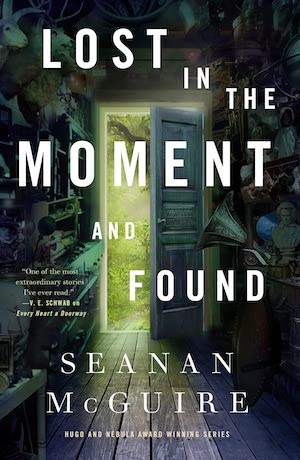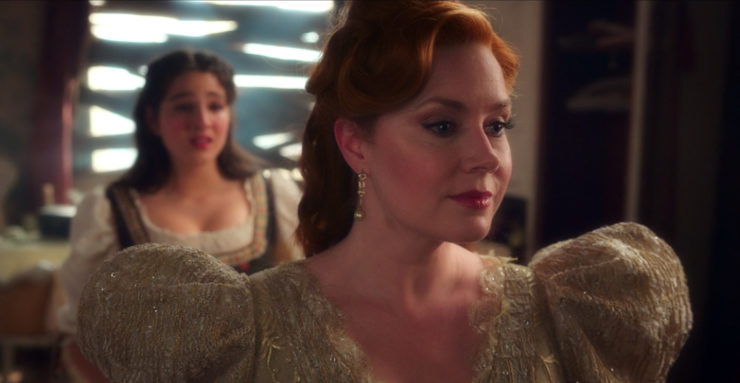If Disney’s Enchanted was a sly-yet-still-sincere fairy tale mashup, its sequel Disenchanted is more like an overproduced, unnecessary remix, atonal and completely missing the point of the magical, musical synergy the first time around. The premise is certainly promising: Giselle (Amy Adams), the Andalasian maiden transported to the mean streets of New York City, has found her Happily Ever After in divorce lawyer Robert (Patrick Dempsey) and his sweet daughter Morgan (Rachel Covey). But enough years have passed since that HEA that this family—with Morgan (Gabriella Baldacchino) now a sarcastic teenager and a new baby in the mix—feel squeezed out of their Manhattan apartment and flee to the suburbs in the hopes of tapping into that magic again. But when naïve, well-meaning Giselle makes a wish for their lives to be more like a fairy tale, she traps them all in a disingenuous fantasy world—one that transforms her into the wicked stepmother.
Yet the movie never follows through on the relationship dynamics that were established before the spell; it misses every opportunity to have Giselle or Morgan actually say or do something wicked, something hurtful, that will need more than a wave of the wand to fix. Despite Enchanted having a whole song dedicated to how you have to tell someone how you feel, Disenchanted forgot the lesson, with the end result being a vacant-eyed, passive adventure into a briefly entertaining modern fairy tale.
Spoilers for Disenchanted, but really there’s not much to spoil.
Part of the awkwardness is that this movie is supposed to take place at most seven years after the original, but it’s been twice as long in real life. (The logline says fifteen years, but that math doesn’t actually work out with regard to Morgan’s age starting high school.) Adams and Dempsey have both clearly aged, though while the latter’s wrinkles and gray hairs are just there and not commented on, the former has been made up to emulate her younger self, which only highlights the passage of time. It’s a shame that they couldn’t simply lean into the actors’ real ages and build a story around that, with Morgan a twentysomething instead of a teenager. The movie’s key tension could still have easily been there, because it centers around the heroine herself.
Whereas Giselle’s adventures in the first film happen because she was pushed, here she is the one pushing others: The move to the suburbs is because she is feeling less like the bubbly princess who can summon wildlife to her with a few notes, and more like, well, a burnt-out stay-at-home parent. The family’s move across the river to Monroeville, NY, is supposed to give Giselle more space to occupy and new people to interact with, but instead she gets a possibly haunted fixer-upper; a lip-curling rival in Malva Monroe (Maya Rudolph), the town’s self-appointed queen; and the limitless ire of Morgan for having to start over at a high school where it’s very much uncool to have a fairy tale princess for a stepmom. Throw in a convenient visit from her and Robert’s exes Edward (James Marsden, having fun) and Nancy (Idina Menzel, who gets a big song because of Idina, not because of Nancy), an Andalasian Wishing Wand (sure), and suddenly Giselle is longing for the very land she said she didn’t need to revisit.
To be sure, there is a lot of subtext laid out here about women aging out of certain archetypes and into new ones, especially when these repulsive personas balance cruelty with enough ambition to make them compelling despite their villainy. But it feels as if the script was never able to be fleshed out beyond the outline; and the actors don’t pick up enough of that subtext to carry it through in their performances. The transformed “Monrolasia” brings to mind Once Upon a Time, or Shrek, but its worldbuilding and rules are wildly inconsistent, and the loose, trope-laden narrative favors awkwardly-staged fight scenes over smaller human moments.
For instance, Robert couldn’t stop saving Giselle in Enchanted, but by the time they’ve moved to the suburbs she doesn’t need any of those fairy tale heroics. Yet the movie doubles down on this quality of his personality, creating a disingenuous ennui related to (gasp) commuting back to New York City, as well as Edward’s passive aggressive (or it would be, if he actually possessed any self-awareness) about Robert not dong enough with his life. Again, the layers are there, but all we get is a flattened fantasy parody of Robert racing after off-screen dragons to slay and bad-CGI giants to trip so that… his Monrolasia life has purpose? Far more effective would have been leaning into the suburban surreality of his fellow commuters and their never-changing routine on the train, with a musical number on the magical train car instead of Robert running through a generic fantasy town set.
But really, the first movie was about Robert and Giselle; this movie should have been more about Giselle and Morgan.
They had the setup, clear as a perfect high note: Fairy tales are what drew Morgan—whose mother left because she couldn’t handle the reality of their lives—to Giselle. So it makes sense that they would be what would eventually drive a wedge between them once Morgan is old enough to appreciate the shades of gray in the world, and once Giselle realizes that there isn’t always a storybook rule for parenting a mouthy teenager.
Morgan clearly feels uncomfortable in the transformed Monrolasia, singing, “Everything’s so perfect, so why aren’t I?” But that rare moment of interiority is overshadowed by her giggly generic princess persona (a combination of Aurora, Belle, and maybe even a bit of the younger Giselle), caught up in a narrative that is trying to propel her to the ball. But which also pushes a cruel stepmother into her path at every turn to stop her from reaching a happily ever after.
Regardless of number of years, it’s clear at the start of the film that Giselle’s naïveté and penchant for breaking into song (which, interestingly, doesn’t seem to conjure as much magic out of ordinary surroundings as it used to) has worn thin on everyone except baby Sophia (and what does she know, she’s a cute potato). It’s a tale as old as time: What used to be magic to an impressionable child has become mundane. And the fact that Giselle fell into their lives loses its romance when her whims are what transport them out of the city into suburbia. Of course these two women would clash.
There was literally even the opportunity for Giselle to say, “Fine! I’ll be the wicked stepmother you seem to think I am!” and to lean into that archetype, given permission by this magic to be swept up in a fairy tale narrative once more. There could have been a throwback to the first moment in Enchanted that Giselle realizes what real love looks like: She may think she loves Edward (James Marsden), but it’s Robert who makes her angry enough that the supposedly negative feeling limns the flowering love. Giselle clearly loves Morgan and vice versa, but their big moments of connection are built on dance montages and memory trees. It would have been far more interesting to see Giselle get angry with Morgan for running away to the city without checking in, or for rejecting her attempts at being a picture-perfect mom, and having to find her way back to love regardless.
Buy the Book


Lost in the Moment and Found
But instead, Disenchanted posits that Giselle is just caught up in the spell, that she’s fighting it to the extent that it’s as if she has a parasitic persona trying to body-snatch her. By insisting on Giselle’s innate goodness, they make her even more passive than when she first landed in New York City; the spell is as caked-on as her makeup, instead of blended into any of her (interesting!) conflicts.
Also, just… Why was the baby even there, except as the inciting incident to move out of a cramped apartment into a more spacious house? Here I was hoping that Disenchanted would posit that postpartum depression might be contributing to Giselle’s feelings of “I used to be good at things,” but alas.
It would also have helped better bridge the divide between herself and Malva, who is a wasted villain; perhaps intended as a red herring to Giselle taking on the mantle of wicked stepmother. Rudolph seems like she’s having fun, but her and Adams’ scenes suffer from too many attempts to pull them apart rather than embracing their chemistry.
To that end, the movie’s only halfway decent number is “Badder,” in which a mid-transformation Giselle and Malva attempt to have an evil-off, but the sequence loses steam once the filmmakers make the baffling choice to split-screen; each woman sings at her idea of the other villainess. Again, the subtext is all there: Malva is HBIC only because everyone’s scared of her, and then here swans in this picture-perfect, ceaselessly sunny mom who seems able to do it all (and who can command birds to help her bake), and who makes Malva look like a fake in comparison. That’s the point—in Enchanted, everyone was drawn to Giselle despite themselves.
But instead, the two moms trying to “have it all” don’t even have their most important song conversations face-to-face. Their final showdown is more akin to a Marvel battle, and the pivotal plot turn is too muddled: Giselle’s spell is leeching the magic from Andalasia into her world (something that doesn’t seem to upset Edward and Nancy at all), but then somehow Malva’s machinations lead to Morgan in a Sleeping Beauty-esque coma, and of course the clock is ticking down to midnight again.
There’s a moment in which it looks as if Giselle will have to choose between Morgan and Andalasia—which one does she love more? But that sacrifice is never actually articulated, and of course things end up fine with no ramifications. And so I almost feel as if I dreamed the deeper dimensions to this movie, as if I’ll wake up tomorrow and have imagined a better version of Disenchanted that is not what actually exists on Disney+. Which is an utter shame, because that clever film deserved a much better encore.
Can you tell that Natalie Zutter rewatched Enchanted for this review? Talk to her about actually good sequels and/or how fantastic Amy Adams was in Arrival on Twitter!










